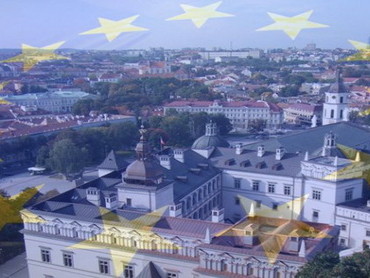The article by the director of IWP Alyona Getmanchuk for “Dzerkalo Tyzhnya” Source: Dzerkalo Tyzhnya
The Presidency of any Central-Eastern country in European Union is more than a simply presidency. It is a chance to prove to tired European colleagues that decision about enlargement of the EU wasn’t a historical mistake. It is also a chance to remind your citizens what they had before the country have entered the EU and what they got as the result of the “coming back to Europe”.
Lithuania feels the whole importance of this moment not only because of the presidency in European Union it has for the next 6 months but also due to the fact because it’s almost the 10th year anniversary since the Central-Eastward expansion of the EU. Thus, it’s a chance to look at the results of the membership since Lithuania has never felt so good once it joined the EU.
There is a thought that if a referendum would be held today regarding the membership to the EU the level of support it would get would be lower than it was before, yet even those who are against Lithuania’s membership in the EU still can figure out why is it exactly that they don’t like.
Surely it’s all because founding from the EU is roughly about 1/3 of the governmental budget. Average salary despite the financial crisis is still around 600 euros. Since the country has joined the EU it has received around 9 billions of euros and according to the functionaries from the European Union, Lithuania has the most effective use of these money. Foreign investments have increased almost by 3 times, even though Russia still remains the main trading partner.
However according to my colleagues from Vilnius, Lithuanians will always find a thing to be upset about. For example, some farmers still dislike the fact that EU subsidiaries are smaller, then their Western colleagues` ones, even though they never had them before the EU.
The elderly complain about many Lithuanians leaving the country in the past 20 years since 1/5 of Lithuania’s population has gone to Ireland and England.
In public discourse Lithuania has always underlined that they are not joining the EU rather than they are coming back to Europe. Former Primer Minister Valdas Adamkus underpins: “We haven’t turned into Europeans, we have always been them”. He believes that the most important is that Lithuania as the result of joining the EU has received a possibility to influence the future of the EU.
Anyways the success story of post-soviet Lithuania in the EU is an important illustration of its presidency in European Union and that is why Vilnius is not only a capital, which rules the EU: it’s a symbol, a certain threshold, where Ukraine may sign an Association Agreement with the EU. The possibility of that happening according to my Vilnius colleagues is around 70%. Yet Lithuanis still ask if “Tymoshenko will be able to receive medical treatment in Germany.”
Yet, since Dalia Grybauskaite has been in power Lithuania itself has tried to change the focus from “poor relatives” of East – Belarus and Ukraine – to more rich neighbours of the North – Scandinavia countries.
It’s obvious that during the voting in the EU the focus will has to get back to “poor relatives”. And if the main opponent of Ukraine in terms of communications with Lithuania appears to be Poland, then in the dialogue with Belarus there’s a better communicator than Lithuania for now.
Of the main tasks of Lithuania’s presidency in the EU avoid repeating the Warsaw’s Eastern Partnership summit where no one came around from Minsk. The most effective way is to follow the Prague’s Eastern Partnership summit scenario.
Anyway, Vilnius is the closest capital to the EU in terms of Minsk and Kyiv. Moreover, as Lithuania Ambassador to Ukraine Petras Vaitiekunas notes, the distance between Vilnius and Kyiv is the same as the distance between Kyiv and Donetsk. I don’t know how about Minsk but Kyiv during the Lithuania presidency in the EU has a great chance to reinforce that sincerity not only in geographical sense, but also in political perspective.
The full text is available in Ukrainian only




Comments theme
Comments themeComments themeComments themeComments themeComments themeComments themeComments themeComments themeComments themeComments themeComments themeComments themeComments themeComments themeComments themeComments themeComments themeComments themeComments themeComments.